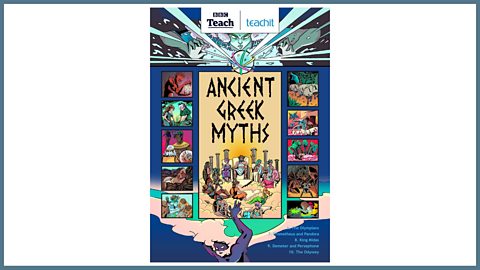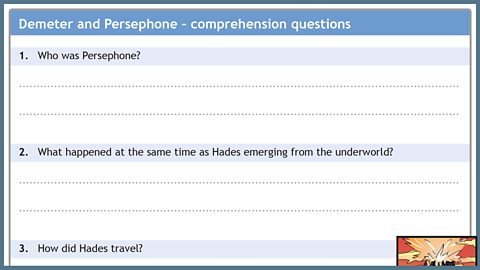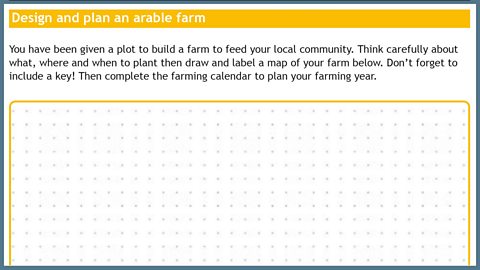The story of Demeter, her daughter Persephone and how each year is divided into seasons.
The video
9: Demeter and Persephone
Persephone was the daughter of Demeter, the Goddess of the harvest, and lived with her mother on the Island of Sicily.
A volcano on the island erupted and Hades emerged from his underworld kingdom. He saw Persephone and instantly fell in love with her.Hades pulled Persephone into his chariot and took her back to the Underworld.
When Demeter found out that Hades had seized her daughter she became very sad and stopped caring about the harvest. All the plants began to wither and die.
Zeus, chief of the gods, promised Demeter he would bring Persephone back. But she could only return if she had not eaten any food while in the Underworld.
Persephone had eaten some seeds from a pomegranate. So Hades demanded that she stay with him forever.
Zeus decided that because Persephone had only eaten a tiny amount she could return to Earth for six months of the year.
And this is how the seasons began. Demeterâs sadness as Persephone leaves for the Underworld makes the plants wither in the Autumn. But they regrow with her joy, when Persephone returns in the spring.

Demeter and Persephone
Synopsis
Demeter is the goddess of the harvest - she makes the plants grow and the crops ripen. One day she is out with her daughter, Persephone, when Hades appears from the underworld. He falls in love with Persephone and drags her back to his underworld kingdom. Demeter is heart-broken and no longer cares for her duties - so the plants wither and die.
Zeus argues with Hades for the return of Persephone, but knows that if she has eaten any food in the underworld she will not be able to return. Persephone has eaten just a few pomegranate seeds, so Zeus determines that she will be allowed to return to Demeter for six months of the year, but then must return to Hades for the other six months. And so this is how we have the seasons: Demeter's sorrow when she loses Persephone causes the plants to wither and die in winterâŠbut spring follows with Demeter's joy when Persephone returns again.

Teacher Notes
Taken from the complete Teacher Notes. See Resources.
Before watching the video
Show children an image of Dante Gabriel Rossettiâs âProserpineâ (an alternative name for Persephone). Have any of the children seen this painting before? Do they know what the lady is holding? Donât give anything away at this stage as you will discuss this further after watching the video.
After watching the video
- Pomegranate painting. Look again at Rossettiâs painting. Can children now identify the lady and the item in her hand? Pomegranates have often featured in literature and art. If possible, have some real pomegranates for children to study. If this is not possible, use images from the web. Cut one open and look at the insides. Invite children to produce a still life drawing or painting of the halved pomegranate for display.
- Power of persuasion. Invite children to write a letter to Hades to persuade him to release Persephone. Remind them to use powerful and persuasive language; Hades is no pushover!
- Demeterâs diary. We get a strong sense of Demeterâs emotions when Persephone leaves for the underworld and when she returns. Write two diary entries for Demeter: one following the day that Persephone leaves for the underworld and one for the day she returns.
- The changing of the seasons. While Ancient Greeks believed that Demeterâs emotions led to the changing of the seasons, these days we know different! Children are to prepare a presentation for another class on why seasons change. This could be an oral presentation with props or, if you have access to animation software, it could take the form of a short film. They should use books, the internet and, of course, their prior knowledge to prepare the presentation. A prompt sheet is provided to help them identify what information they should include.
- Young farmers. Charge children with designing their own small arable farm to provide crops for the local community. Using their understanding of the seasons they should design the farm, decide what they will plant, where and when. A template is provided for this.

Resources - Teacher Notes from Teachit
Comprehensive Teacher Notes covering episodes 6 to 10, including worksheets and activities.

Click to display the worksheet full-size or print it (taken from the Teacher Notes).

Click to display the worksheet full-size or print it (taken from the Teacher Notes).

The Teacher Notes for this series have been prepared in partnership with .

Other resources
±«Óătv Teach: Tales from Ancient Greece - audio versions of more popular Ancient Greek myths
